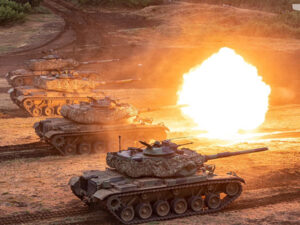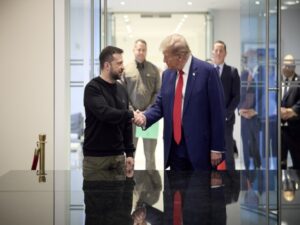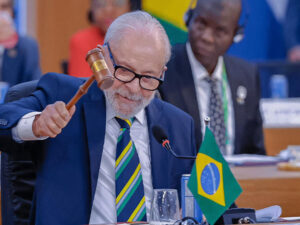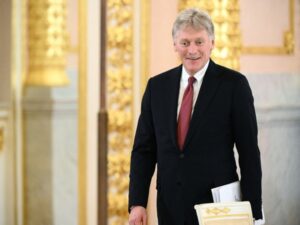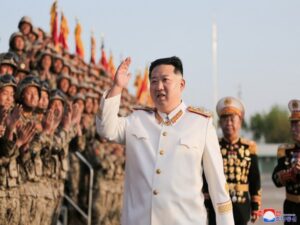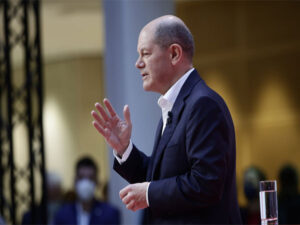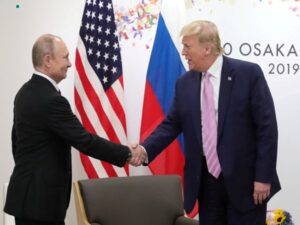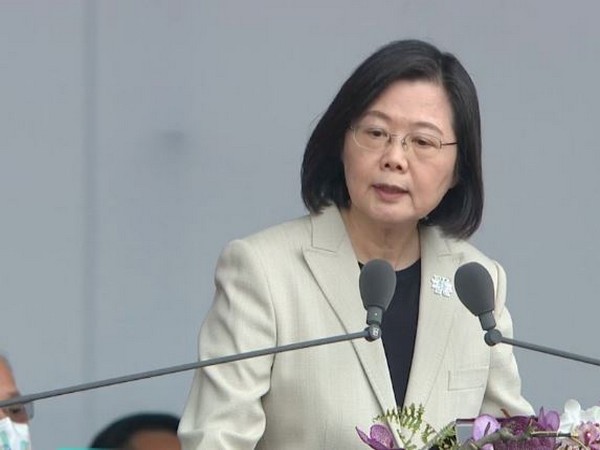
Taipei [Taiwan], October 10 (ANI): Taiwanese President Tsai Ing-wen on Monday stated that there is “no room for compromise” over the sovereignty of the island nation and warned China that resorting to war must not be the option for cross-strait relations.
Tsai Ing-Wen made the remarks in a speech marking Taiwan’s National Day, also called Double Ten Day today. “The consensus of the Taiwanese people … is to defend our sovereignty and our free and democratic way of life. There is no room for compromise on this,” President Ing-wen said during her national day speech, reported CNN.
“I call on the Beijing authorities that resorting to war must not be the option for cross-strait relations,” Tsai said and added, “Only by respecting Taiwanese people’s insistence on sovereignty, freedom and democracy can we resume positive interactions across Taiwan Strait.”
Amid heightened tensions after the visit of US House Speaker Nancy Pelosi, the Taiwanese president noted, “The international community is very clear that defending Taiwan’s security equals defending regional stability and democratic values. If Taiwan’s democratic freedoms are destroyed, it will be a major setback for democracies around the world.”
Today’s festivities were attended by international guests including the President of Palau – one of 14 countries that have full diplomatic relations with Taiwan. US congresswoman Eddie Bernice Johnson, a Democrat from Texas, was also in attendance, reported CNN.
The Taiwanese President drew a parallel to the Russia-Ukraine conflict “Russia continues its war against Ukraine, while China’s military activity in the South China Sea, East China Sea, and the Taiwan Strait undermine peace and stability in the Indo-Pacific region. We absolutely cannot ignore the challenge that these military expansions pose to the free and democratic world order. These developments are inextricably connected with Taiwan,” Tsai Ing-wen said as quoted by Focus Taiwan , which published a full text of her National Day speech .
Earlier, Taiwanese President Tsai Ing-wen had pledged Taiwan’s resolve to engage with the world to counter “a resurgence of authoritarianism,” despite Beijing’s threats. Taiwan has been facing repeated incursions from China’s military, especially after US House Speaker Nancy Pelosi’ visit. Live-fire missile tests, large-scale military manoeuvres all along China’s coast, warplanes crossing the median line of the Taiwan Strait, and civilian drones flying over Taiwan-held islands close to China have all become more commonplace since Pelosi’s trip.
The tensions between China and Taiwan heightened after the visit of US lawmakers to the self-governed island. The visit by Pelosi became the highest-ranking US official to touch down on the island in 25 years, was cited by Beijing as the trigger for several days of large-scale military exercises in which China fired missiles over Taiwan and several Chinese warplanes breached Taiwan’s air defence identification zone.
Ever since the visit of the US delegation, Beijing launched large-scale military exercises in the vicinity of the island, which included live-fire drills and military aircraft overflights close to Taiwan’s airspace.
Post Pelosi’s visit, a US delegation, then Indiana Governor Eric Holcomb and then US Senator Marsha Blackburn also visited Taiwan, which irked China.
All of this is also coming in the backdrop of China’s 20th National Party Congress where Chinese President Xi Jinping is eyeing to secure a third term in power. (ANI)
We must combat ‘Taiwan independence’ separatist activities with firmest resolve: China at UNGA
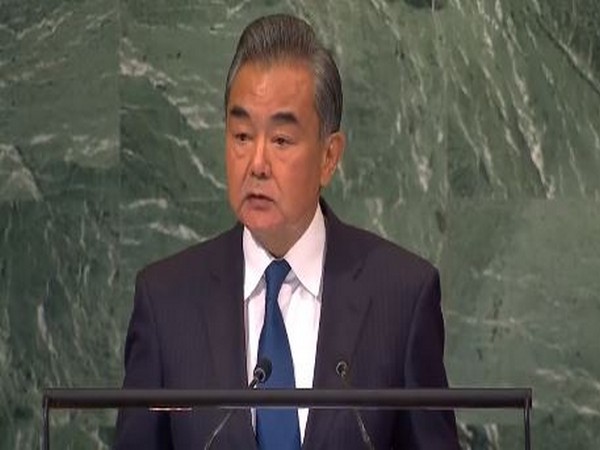
New York [China], October 11 (ANI): To achieve ‘reunification’, Chinese Foreign Minister Wang Yi warned Western countries that it will take to “most forceful steps” to repulse interference by external groups in Taiwan.
Representing the communist government at the United Nations General Assembly, Foreign Minister Wang Yi issued a warning at the outset, before trying to make a case for China’s role in the international community, reported JustEarth news. Emphasizing on Taiwan, he said that China will continue to endeavour to achieve “peaceful reunification with the greatest sincerity and greatest efforts”. To realize this goal, we must “combat ‘Taiwan independence’ separatist activities with the firmest resolve and take the most forceful steps to repulse interference by external groups,” JustEarth news quoted Wang as saying.
Laying down, China’s policy on Taiwan, he said, “Only by resolutely forestalling in accordance with the law separatist activities can we forge a true foundation for peaceful reunification. Only when China is completely reunified can there be enduring peace across the Taiwan Strait.” Further, he warned that any scheme to interfere in China’s internal affairs is bound to meet strong opposition, and any move to obstruct China’s cause of reunification is bound to be crushed by the wheels of history, reported JustEarth news.
Notably, this comes ahead of the 20th party Congress that is scheduled to anoint Xi Jinping for the third time. “Peace is crucial for our future and it underpins the common security of all countries. Turbulence and war can only open Pandora’s box, and he who instigates a proxy war can easily burn his own hands. Pursuing one’s own absolute security can only undermine global strategic stability. We should remain committed to addressing differences through peaceful means and resolving disputes through dialogue and consultation,” added Wang.
However, the tough stance of China at UNGA blew cold on the question of Ukraine, Afghanistan and Palestine. On Ukraine, he said, “China supports all efforts conducive to the peaceful resolution of the Ukraine crisis. We call on all parties concerned to keep the crisis from spilling over and protect developing countries’ legitimate rights and interests.”
Referring to Palestine, he said “justice is already late in coming, but it must not be absent”, adding that the “two-state solution is crucial for upholding fairness and justice” and that China will continue to “support the Palestinian people in pursuing their just cause of restoring legitimate national rights.”
Touching upon the Afghanistan question, Wang said, “Afghanistan is in a critical transition from chaos to order. The right way forward is to put in place an inclusive political framework and adopt moderate policies. The goal should be to resume economic growth and improve people’s lives.” China also proposed to quickly resolve the Korean Peninsula nuclear issue, saying “it is important to address its root cause” and “follow the dual-track approach and take phased and synchronized steps”. (ANI)







